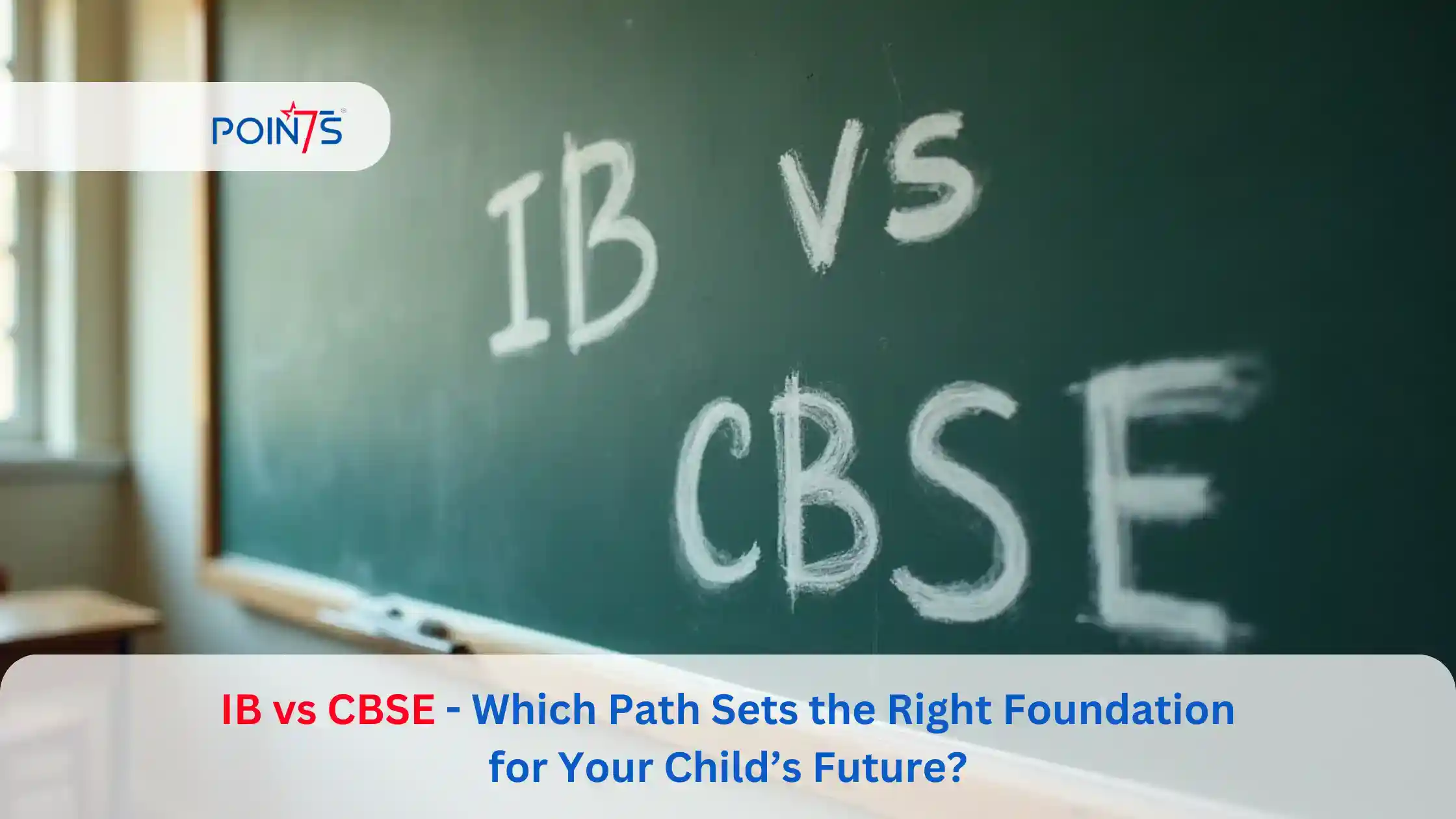Selecting the most suitable educational board is a crucial decision that shapes a student’s academic and professional journey. In India, two prominent boards- CBSE and IB offer unique learning experiences and teaching philosophies. Each board paves a different educational path, one rooted in national excellence, the other offering global exposure. Understanding these differences isn’t just about academics; it’s about aligning your child’s potential with a future full of opportunities. So, when it comes to IB vs CBSE board, which aligns with your child’s aspirations and learning style? This article breaks down the essential differences between the IB board and CBSE to help students and parents choose based on long-term goals.
A Brief Overview of the Boards
Every educational board has a unique vision for how learning should take place. While CBSE is grounded in a national academic framework emphasising consistency and examination success, IB is rooted in inquiry-based, student-centric learning. Understanding these core philosophies helps make an informed decision in the IB vs CBSE comparison. Let’s explore what defines the IB Board and CBSE, starting with their foundational principles.
CBSE Board
The Central Board of Secondary Education (CBSE) is one of India’s most trusted national boards. Known for its structured curriculum, CBSE supports uniform education across Indian schools. It primarily emphasises academic preparation for national competitive exams like JEE and NEET. With a strong focus on theoretical knowledge and standardised testing, CBSE is aligned with the Indian higher education system. It is ideal for students seeking stability and clarity in academic content, especially for careers rooted in science, engineering, or medicine. CBSE’s widespread recognition within India ensures smooth transitions between schools nationwide.
IB Board
Wondering what is IB? The International Baccalaureate (IB) is a globally respected education system designed to develop students with international perspectives. It prioritises holistic learning and cultivates critical thinking, research, and global citizenship. If you’re researching IB school full form, it stands for International Baccalaureate School, offering programs like the IB Diploma. Universities around the world widely accept it. The IB encourages students to engage with real-world issues and interdisciplinary learning, preparing them for life beyond academics. Its global curriculum primarily benefits students planning to pursue higher studies abroad.

Top 5 Key Differences: IB Board vs CBSE
By understanding their key differences, parents and students can make a choice that supports both current learning needs and future ambitions. When it comes to choosing between the IB vs CBSE, these five distinctions can help clarify which board aligns best with your child’s aspirations:
Educational Focus
The CBSE board is ideal for students aiming for Indian universities, offering a nationally relevant curriculum. In contrast, the IB board is designed with a global perspective, preparing students for international academic environments. This difference is a major point of comparison in the IB board vs CBSE debate. CBSE emphasises a linear academic progression suited to Indian standards. IB encourages open-mindedness and cultural sensitivity, fostering international awareness from an early age.
Curriculum Design
CBSE favours a content-heavy, exam-oriented approach that centres on textbook learning. IB schools, on the other hand, focus on inquiry-based education. The IB vs CBSE distinction is obvious here. IB promotes interdisciplinary study and conceptual understanding. CBSE students often follow fixed learning paths with a strong focus on core subjects. IB allows for subject choice flexibility, encouraging exploration of personal interests alongside academics.
Assessment Methods
Traditional testing dominates the CBSE evaluation process. It measures retention and recall. IB assessments are more diverse, involving essays, case studies, presentations, and peer evaluations. This broader evaluation style is another key aspect of the IB board vs CBSE. IB also emphasises internal assessments and teacher evaluations, providing a more rounded view of student performance. CBSE prioritises performance in board exams, which can be high-pressure for some learners.
Academic Rigor
While CBSE is rigorous in its own right, IB is widely recognised for its high academic demands. Students must balance multiple disciplines, projects, and global perspectives. This makes IB vs CBSE a matter of individual learning capacity and future goals. IB students engage in Theory of Knowledge (TOK), Extended Essays, and CAS (Creativity, Activity, Service), adding depth and challenge. CBSE focuses more on board results, which are crucial for national competitive exams.
Student Suitability
CBSE is best for students focused on Indian entrance exams and university admission. The IB program is tailored for globally minded learners aiming for international colleges. When weighing the IB board vs CBSE, consider your child’s career destination India or abroad. CBSE is ideal if your child thrives in structured systems with clear targets. For students who enjoy independent learning and critical inquiry, IB may offer a more enriching experience.
Who Should Choose What: IB vs CBSE?
Deciding between IB vs CBSE depends on your child’s academic goals and personal strengths. CBSE supports students who thrive in a structured, exam-focused system and plan to study within India. The IB board, however, suits students who prefer creative learning methods, project-based assessments, and international exposure.
Still unsure what is IB? The educational framework values research, reflection, and critical inquiry. Those seeking a more profound understanding and flexibility in subjects may find IB more enriching than CBSE.
Moreover, understanding the IB school full form and ethos is vital. It stands for International Baccalaureate School, where education focuses on knowledge, application, empathy, and global relevance.
Making an Informed Decision About IB Board vs CBSE
Before choosing a board, consider the student’s learning style, university goals, and long-term aspirations. If you’re preparing for Indian entrance exams and want a straightforward syllabus, CBSE may be your best bet. However, if you’re leaning toward studying abroad, developing research skills, and gaining a global mindset, IB is a stronger contender in the IB board vs cbse comparison.
Remember that the IB vs CBSE debate isn’t about which board is better overall, but which fits your personal or academic goals. The IB board promotes independence and global awareness, while CBSE provides a deep grounding in core subjects aligned with Indian academics. IB students often benefit from structured support like IB MYP tutoring, which builds strong analytical and inquiry skills early on. For senior students, IBDP online platforms offer flexibility and access to high-quality instruction across the globe. Ultimately, the right choice depends on your learning style, future aspirations, and academic environment in which you thrive.
Conclusion
At Points Edulab, we understand the importance of making informed educational choices. Whether you’re navigating the structure of CBSE or exploring what is IB, the key is to align your decision with your child’s future ambitions.
The IB school full form, International Baccalaureate School, represents more than just a curriculum. It reflects a commitment to shaping global citizens. In the ongoing discussion of IB board vs CBSE, it’s essential to look beyond the syllabus and evaluate what kind of learner your child is and what environment will help them thrive.
Stay connected with Points Edulab for more insights, resources, and expert advice on the evolving education landscape. Whether IB vs CBSE, college admissions, or curriculum planning we’re here to help guide your path.




